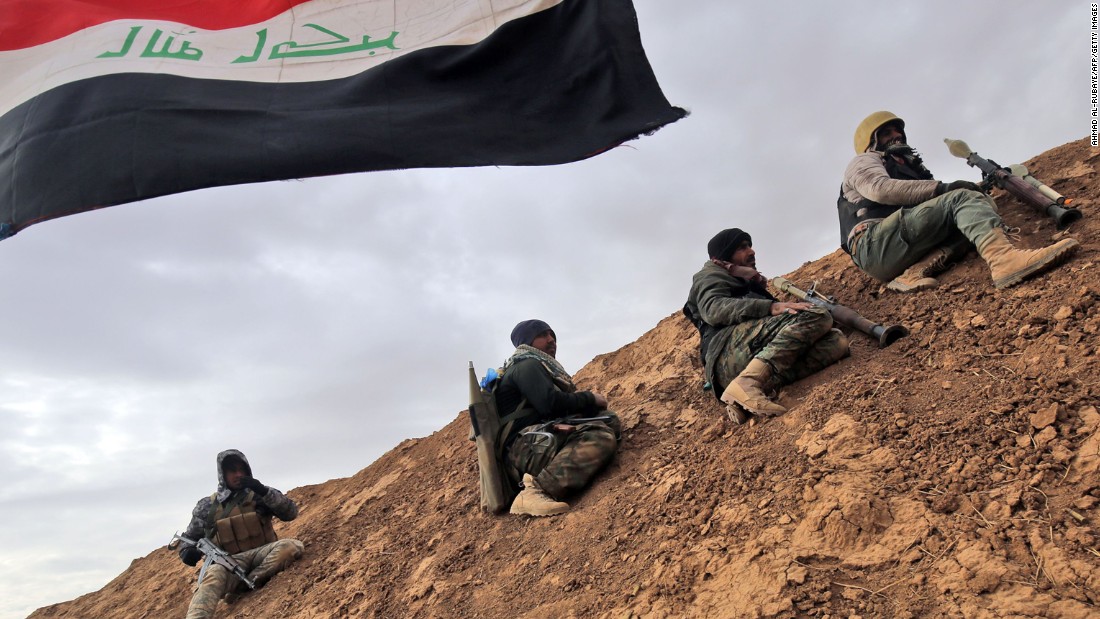
The strike, believed to be Israel's first in Iraq in several decades, likely targeted militia groups that have a close relationship with Iran.
The officials added that the US is looking at several possible scenarios that could involve Iran or its proxies carrying out an attack in retaliation.
The US has some 5,200 troops in Iraq, where they assist Iraqi forces battling the remnants of ISIS.
The US has refused to officially say whether Israel was involved but has denied any responsibility for the strike, saying Iraq's sovereignty should be respected.
Several other military facilities belonging to Iranian-backed groups in Iraq have also been rocked by a series of explosions, but at this time the US believes Israel is responsible for only one of those blasts, with the officials telling CNN that several other scenarios could have caused the other explosions, including poor practices with regard to the storage of munitions and explosives.
The Pentagon has denied any involvement in the explosions, which have occurred at facilities and military camps associated with a group of militias known as Iraq's Popular Mobilization Forces, many of which are backed by Iran.
Asked about the possibility that Israel was behind any of the strikes, Pentagon spokesman Cmdr. Sean Robertson said, "We support Iraqi sovereignty and have repeatedly spoken out against any potential actions by neighbors that could lead to violence in Iraq. Iraqis have a right to control their own internal security ant protect their democracy."
The US charge d'affaires at the American Embassy in Baghdad was summoned by the Iraqi minister of foreign affairs to discuss the incident, an Iraqi diplomat tells CNN, adding that the Israeli strikes and the US knowledge of them are a potential game changer in the US-Iraqi relationship.
However, a US State Department official denied that the American diplomat had been summoned, saying the meeting had been pre-scheduled and that they had met "to discuss a variety of issues."
Iraq's government has also issued new restrictions about the use of Iraqi airspace in the wake of the explosions, regulations that have affected the US-led military coalition fighting ISIS.
Israel has publicly admitted to carrying out airstrikes against Iran-linked targets in Syria but has yet to admit to being involved in airstrikes in Iraq.
Israeli Prime Minister Benjamin Netanyahu has refused to confirm -- or knock down -- suggestions that Israel was responsible for the series of unexplained attacks on militia sites in Iraq in recent weeks.
Asked during an interview on Israel's Channel 9 television on Thursday whether Israel was conducting operations in Iraq, Netanyahu, who also acts as the country's defense minister, answered: "We act in many arenas against a country which seeks to destroy us. Of course, I have given the security forces a free hand and the instruction to do what is needed to thwart these plans of Iran."
Describing the threat, the Israeli leader accused Iran of "trying to establish bases against us everywhere, in Iran itself, in Lebanon, in Syria, in Iraq, in Yemen."
"I don't give Iran immunity anywhere," Netanyahu added.
The Pentagon also warned Iran against using "Iraqi territory to threaten other countries in the region," Robertson said in a statement. "Iran must not use Iraqi territory to threaten other countries in the region. Iran's destabilizing activities undermine Iraq's security and increase the risk of regional conflict."
No comments:
Post a Comment